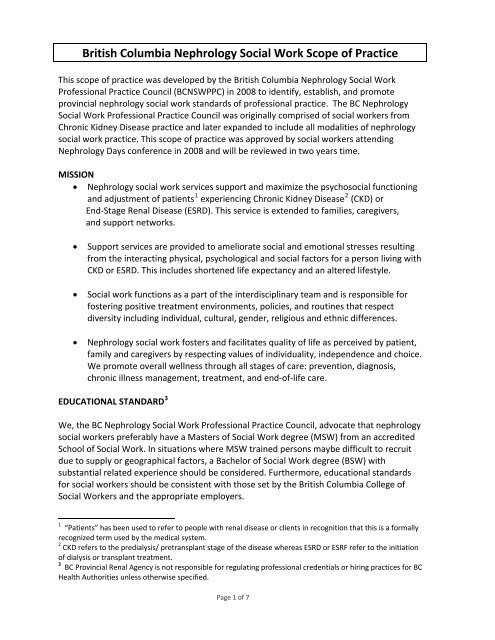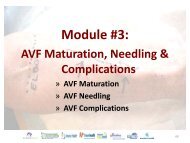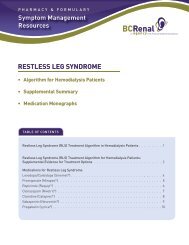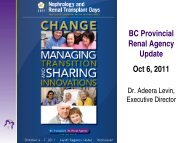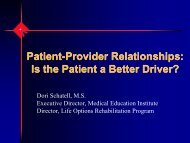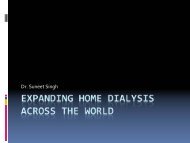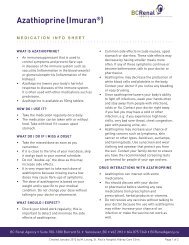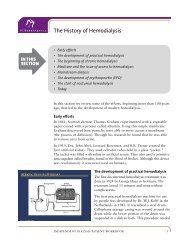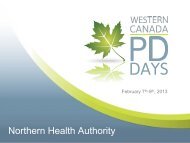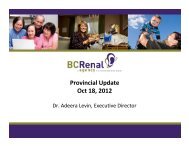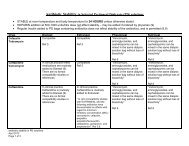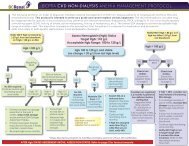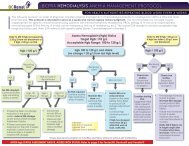Nephrology Social Work Scope of Practice - BC Renal Agency
Nephrology Social Work Scope of Practice - BC Renal Agency
Nephrology Social Work Scope of Practice - BC Renal Agency
You also want an ePaper? Increase the reach of your titles
YUMPU automatically turns print PDFs into web optimized ePapers that Google loves.
British Columbia <strong>Nephrology</strong> <strong>Social</strong> <strong>Work</strong> <strong>Scope</strong> <strong>of</strong> <strong>Practice</strong>This scope <strong>of</strong> practice was developed by the British Columbia <strong>Nephrology</strong> <strong>Social</strong> <strong>Work</strong>Pr<strong>of</strong>essional <strong>Practice</strong> Council (<strong>BC</strong>NSWPPC) in 2008 to identify, establish, and promoteprovincial nephrology social work standards <strong>of</strong> pr<strong>of</strong>essional practice. The <strong>BC</strong> <strong>Nephrology</strong><strong>Social</strong> <strong>Work</strong> Pr<strong>of</strong>essional <strong>Practice</strong> Council was originally comprised <strong>of</strong> social workers fromChronic Kidney Disease practice and later expanded to include all modalities <strong>of</strong> nephrologysocial work practice. This scope <strong>of</strong> practice was approved by social workers attending<strong>Nephrology</strong> Days conference in 2008 and will be reviewed in two years time.MISSION• <strong>Nephrology</strong> social work services support and maximize the psychosocial functioningand adjustment <strong>of</strong> patients 1 experiencing Chronic Kidney Disease 2 (CKD) orEnd‐Stage <strong>Renal</strong> Disease (ESRD). This service is extended to families, caregivers,and support networks.• Support services are provided to ameliorate social and emotional stresses resultingfrom the interacting physical, psychological and social factors for a person living withCKD or ESRD. This includes shortened life expectancy and an altered lifestyle.• <strong>Social</strong> work functions as a part <strong>of</strong> the interdisciplinary team and is responsible forfostering positive treatment environments, policies, and routines that respectdiversity including individual, cultural, gender, religious and ethnic differences.• <strong>Nephrology</strong> social work fosters and facilitates quality <strong>of</strong> life as perceived by patient,family and caregivers by respecting values <strong>of</strong> individuality, independence and choice.We promote overall wellness through all stages <strong>of</strong> care: prevention, diagnosis,chronic illness management, treatment, and end‐<strong>of</strong>‐life care.EDUCATIONAL STANDARD 3We, the <strong>BC</strong> <strong>Nephrology</strong> <strong>Social</strong> <strong>Work</strong> Pr<strong>of</strong>essional <strong>Practice</strong> Council, advocate that nephrologysocial workers preferably have a Masters <strong>of</strong> <strong>Social</strong> <strong>Work</strong> degree (MSW) from an accreditedSchool <strong>of</strong> <strong>Social</strong> <strong>Work</strong>. In situations where MSW trained persons maybe difficult to recruitdue to supply or geographical factors, a Bachelor <strong>of</strong> <strong>Social</strong> <strong>Work</strong> degree (BSW) withsubstantial related experience should be considered. Furthermore, educational standardsfor social workers should be consistent with those set by the British Columbia College <strong>of</strong><strong>Social</strong> <strong>Work</strong>ers and the appropriate employers.1 “Patients” has been used to refer to people with renal disease or clients in recognition that this is a formallyrecognized term used by the medical system.2 CKD refers to the predialysis/ pretransplant stage <strong>of</strong> the disease whereas ESRD or ESRF refer to the initiation<strong>of</strong> dialysis or transplant treatment.3 <strong>BC</strong> Provincial <strong>Renal</strong> <strong>Agency</strong> is not responsible for regulating pr<strong>of</strong>essional credentials or hiring practices for <strong>BC</strong>Health Authorities unless otherwise specified.Page 1 <strong>of</strong> 7
ETHICAL PRACTICEThe nephrology social worker is to practice with accountability, confidentiality, ethicalguidelines, and without conflict <strong>of</strong> interest. In <strong>BC</strong>, registered social workers (RSW) mustfollow the Code <strong>of</strong> Ethics and Standards <strong>of</strong> <strong>Practice</strong> as outlined by the B.C. College <strong>of</strong> <strong>Social</strong><strong>Work</strong>ers (<strong>BC</strong>CSW). Other useful resources which support nephrology social work ethicalpractice are the British Columbia Association for <strong>Social</strong> <strong>Work</strong>ers (<strong>BC</strong>ASW), CanadianAssociation <strong>of</strong> <strong>Social</strong> workers (CASW), and the Canadian Association <strong>of</strong> <strong>Nephrology</strong> <strong>Social</strong><strong>Work</strong>ers (CANSW).PROFESSIONAL PRACTICE STANDARDS1. Referrals, Assessment and Continuity <strong>of</strong> Care• Aim for positive health outcomes by reducing the risk <strong>of</strong> psychosocial complications,delaying disease progression, promoting wellness, and facilitating links toappropriate resources.• Accept referrals from patients, families, health care providers, community partnersor any other party involved in care.• Triage, assess, and manage high‐risk and complex cases.Examples <strong>of</strong> psychosocial risks and issues, which may be screened, are as follows:ooooooooooooooAbuse, Neglect, SafetyActivities <strong>of</strong> Daily LivingAdvance Care PlanningCaregiver StressCognitive DeficitsCoping, Anxiety, DepressionGrief, Bereavement and LossEducation and VocationFamily Stress and ConflictFinancesHealth Consent ComplexitiesHome EnvironmentIllness ManagementImmigration and Settlemento Isolationo Language and Cultural Needso Legal Resourceso Medical Benefitso Mental Healtho Rehabilitationo Self Imageo Sexual Healtho Sheltero <strong>Social</strong> Supporto Substance Misuseo Transportationo Treatment Decision Supporto Other Complex Care Needs• Facilitate continuity <strong>of</strong> care by completion <strong>of</strong> timely, comprehensive and concisepsychosocial assessments, updating chart correspondence, reporting to teammembers, and transferring relevant information to key service providers for seamlesstransfer <strong>of</strong> care.Page 2 <strong>of</strong> 7
2. Counselling and Advocacy• Counsel patient and family regarding coping, crisis management, problem solving,health management, decision‐making, resources, and other psychosocial needs byutilizing appropriate therapeutic interventions.• Share information about peer support resources with patient and family tocomplement emotional support and education needs.• In collaboration with the health care team, ensure patients, families and caregivershave accurate and adequate information about diagnosis and prognosis so thatthey are able to make the appropriate health care decisions.• Provide help with negotiating the complex health care system and advocate forpatient and family rights within the health care system.3. Cultural Competence• Collaborate and work effectively in diverse multicultural, socioeconomic,demographic, and geographic environments.• Advocate for fair and equal access to service for all human beings.• <strong>Practice</strong> respectful interventions regardless <strong>of</strong> gender, age, ethnicity, language,culture, sexual orientation, financial status, spiritual, physical and mental abilities.• Explore and include patient and family cultural beliefs, values, and needs in careprovision.4. Chronic Disease Management and Self‐Management• Educate and support patient and family about chronic disease management,delaying disease progression and maintaining a healthy lifestyle.• Foster self‐management, engagement and motivation for positive outcomes suchas improved confidence, commitment to behaviour change, problem solvingcapabilities, and self‐advocacy skills. Encourage participation in community basedself‐care programs.• Collaborate with complementary chronic illness programs for comprehensive andintegrated health care.Page 3 <strong>of</strong> 7
5. Advance Care Planning• Educate and counsel patient, family and healthcare team members regardingAdvance Care Planning and Advance Medical Directives.• Facilitate and identify patient’s future health care values, wishes, decisions, proxydesignate, legal and financial planning, and review for change as needed.• Coordinate Palliative Care and End‐<strong>of</strong>‐Life care services with patient, family,interdisciplinary teams, and community resources, which honour the patient’sAdvance Care Plan.6. Education, Teaching and Leadership• Develop and provide individual or group education for patients, families, andcommunity partners on such issues as coping, illness management, wellness,treatment, resources, and other renal or psychosocial topics.• Develop education materials in the areas <strong>of</strong> renal care, social work andinterdisciplinary practice for presentation to health pr<strong>of</strong>essionals, trainees,students, and community partners.• Provide mentorship, training, supervision, and leadership to social workstudents and staff and all other multidisciplinary health pr<strong>of</strong>essionals.7. Data Management and Program Development• Collect data and submit service trends to appropriate health care administrators foradequate social work resource allocation, program development, policy guidelines,and health infrastructure.• Develop, implement, and evaluate programs for safe, effective, efficient, and highquality patient care.• Collaborate with key stakeholders on building programs, which aim for optimalhealth outcomes and best clinical practice.• Advocate for adequate, comprehensive and progressive health resources at local,regional, provincial, national, and international levels.Page 4 <strong>of</strong> 7
B.C. <strong>Nephrology</strong> <strong>Social</strong> <strong>Work</strong> Pr<strong>of</strong>essional <strong>Practice</strong> Council 2008Chad Ballard BSW, RSW; Interior Health AuthorityClaire Skjelvik MSW; Vancouver Coastal Health AuthorityConnie Poling BSW; Interior Health AuthorityIris Brendle‐Moczuk MSW, RSW; Interior Health AuthorityJudy Beelen BSW, RSW; Interior Health AuthorityLinda Church MSW, RSW; Vancouver Island Health AuthorityOrlando Frizado MSW; Vancouver Coastal Health AuthoritySandi Robinson MSW; Vancouver Island Health AuthoritySarb Basra MSW, RSW; Fraser Health Authority_______________________________________________Page 7 <strong>of</strong> 7


